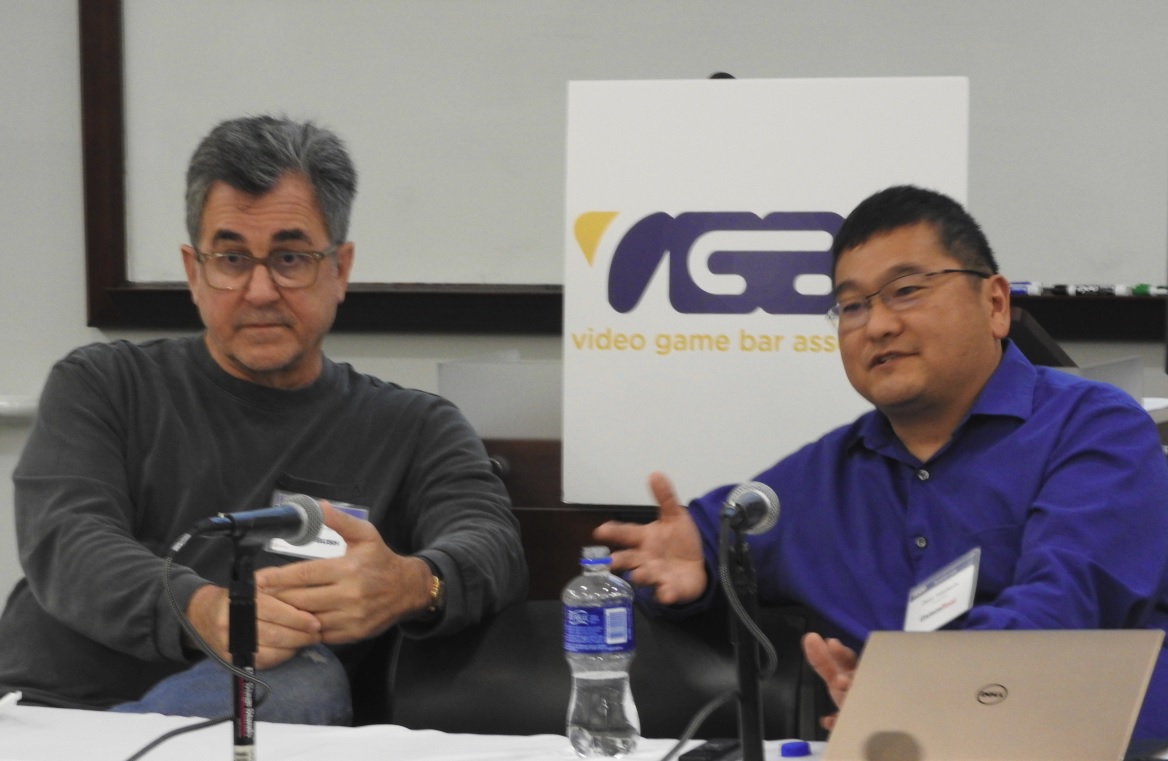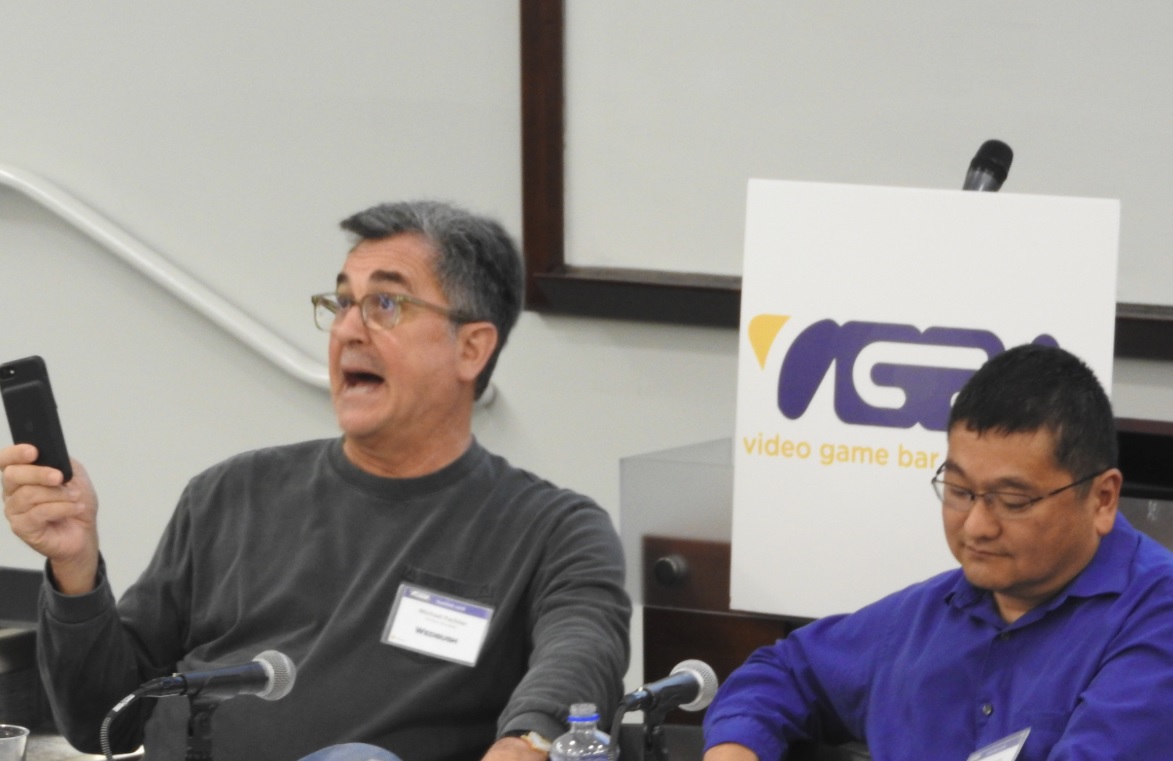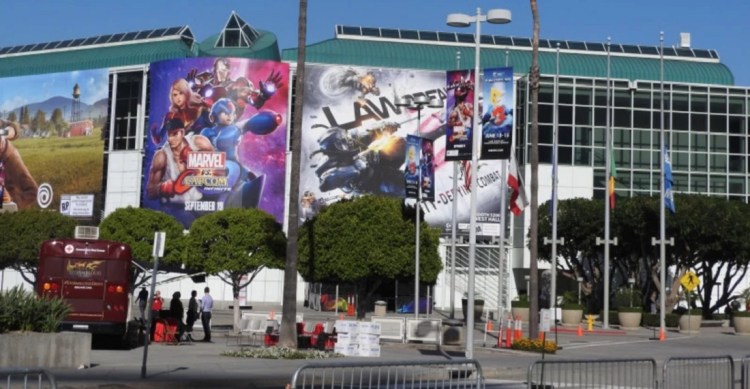testsetset
Michael Pachter, currently at Wedbush Securities, has been an analyst on video games for decades, and he is never shy about sharing his opinions on what has become a $137.9 billion business, according to market researcher Newzoo.
While he’s pretty loud, he’s also astute when it comes to his observations about games and the inner workings of big game companies such as Sony, Microsoft, Nintendo, Electronic Arts, and Activision Blizzard. I did a fireside chat with Pachter at the recent Video Game Bar Association event in Los Angeles.
We talked about disruption coming in the competition between the core game companies and the big platform owners like Amazon, Google, Facebook, and Apple. We talked about the opportunities in cloud gaming and subscriptions. We touched on blockchain and cryptocurrency and their effect on games. And we chatted about the hype around esports and where the true opportunities lie. And I shared my own opinions too.
Here’s an edited transcript of our interview. And FYI, we’ll have a breakfast about cloud gaming at E3 on June 14. Ping me on Twitter at deantak if you are interested in attending.
June 5th: The AI Audit in NYC
Join us next week in NYC to engage with top executive leaders, delving into strategies for auditing AI models to ensure fairness, optimal performance, and ethical compliance across diverse organizations. Secure your attendance for this exclusive invite-only event.

Above: Michael Pachter of Wedbush Securities and Dean Takahashi of GamesBeat at the Video Game Bar Association.
Audience: What’s the biggest disruption you see in the next two years of the game industry?
Michael Pachter: Two years is maybe early, but this is happening, 100 percent happening. The CPU in this thing is faster than a PS2, by a lot. Probably close to a PS3. If I had an iPhone X, if I wasn’t so cheap, it would be faster than a PS3. GPUs aren’t there yet, but any laptop or desktop kicks the crap out of a PS4 or Xbox One. All these devices we’re getting in our homes, like Google Home and Apple HomePod and Apple TV, anything that Alexa can talk to, those are going to have GPUs. The Echo Show already does. Which means we don’t need consoles.
That’s pretty disruptive. Obviously you can buy an Echo Show for $229 or whatever they cost, or you can buy an Xbox One for $249. You’re not saving that much. But if you’re a kid you can talk your mom into why you need an Alexa-enabled device because you want to know what the weather is in Chile that day or whatever.
Amazon has sold something like 20 million Echos so far. Apple’s got about 40 million Apple TVs. Google obviously is all over it. I would say in two years, you’ll have 100 million of those devices out there. If those companies tell you, “Hey, by the way, want to play Call of Duty? Just download it to your device and we’ll send you a controller to play it,” that will expand the addressable market for games exponentially.
I’d say it’s probably five to seven years of migration, but the game market becomes anybody with a PC or a laptop playing on their television like it’s a console with a controller. That just removes the console purchase as a barrier to entry. You want to be selling software into that. That’s a software developer’s win.
Think of this like the movie industry in the ‘40s, where the only place you could see a movie was a theater. It took 65 or 70 years for television, VCR, VHS tapes, DVD, pay-per-view, on demand, then streaming. But you get all these windows now for a movie. They don’t talk box office at studios anymore. They talk ultimate, because they think about all the ways people see a movie. That’s what we’re going to be talking about for games. That’s disruptive.
You’ll hear about this in two years. In 2020, somebody is rolling it out, whether it’s Amazon—Amazon is so far ahead of everybody on this, as they’re ahead of everybody else on everything. This matters to them. They’re going to make it happen.

Above: Sony’s banner atop the LA Convention Center
GamesBeat: I’d say the same thing, except I’d put it in terms of the intentional game companies versus the accidental game companies. Sony, Microsoft, and Nintendo I see going to war with Google, Apple, Amazon, and Facebook. If those guys, the bigger guys, ever really wake up to the opportunity that they have in games, then I think they could come in and crush Sony and Nintendo. Microsoft has a nice cash cushion that protects it against potentially anti-competitive behavior. But those big guys coming in and giving away stuff for free could be very disruptive.
Pachter: Microsoft’s moving in this direction with Xbox Anywhere, Windows 10. If you have Windows 10 and you buy a game on your Xbox, it’s on your desktop. They’re way ahead. They know this is coming. They’re trying to figure out how to participate. They have a cloud business to defend, but they also have a cloud business that will allow this to happen.
It’s Amazon or them, I think. I don’t think Apple has the first clue what they’re doing. Google is doing too many things. Amazon is focused. They must have 500 people working in their games division. They’re on it. It’s all part of the Alexa ecosystem. I think Amazon wins. But I agree. Microsoft is going to make a run at it as well. It’ll probably be multiple players.
You just want to be Activision. You don’t care where people get Call of Duty. It’s just like Disney doesn’t really care if I see Black Panther in the theater or I buy the DVD or I watch it on pay-per-view. Even if I watch it on commercial television, I’ll buy more Black Panther merchandise. They’re all over it.
Audience: But ultimately Disney does care if you watch Black Panther on Netflix, or whatever they create for their subscription model. If we extrapolate from there, how are the people in this room that are making triple-A content going to be able to actually make money when you flip to a subscription model?
Pachter: Something you learn in your first year of business school—it’s a topic that made no sense in business school and makes perfect sense now. Linear programming. It’s coming up with multiple revenue streams and figuring out how to maximize profit if you have all these different revenue streams. The movie studios are masterful at it. That’s why we have Windows. That’s what’s going to happen to game companies.
The game companies are going to figure out—is there a Netflix window for a game? Is that where they want to do it? Maybe they won’t make as much. This is why commercial television broadcast of movies doesn’t happen day and date with theatrical release. It happens 14 years later. You have cable channels that get it early. You have HBO getting it after a year. The game companies will have to learn and figure this out, but they’ll maximize profit.
The point is that there is a person someplace – let’s say some 40-year-old Italian guy – who has a job and a wife and three kids, and he doesn’t have a console because his wife would kill him if he brought one home, and he loves FIFA. That’s the only game he would play. If he could buy FIFA and sneak it in and play an hour a week, he’d pay the 50 euro for FIFA. You’re going to deliver that to him.
GamesBeat: Do you see the Nvidia Shield as that box, as it is now? Or some version of that?
Pachter: Honestly, when they took my headphone jack away, these bastards—I bought the little docking station because it has a headphone jack. I work from home and I use a headset. I look at that thing and I think, if it was just this thick instead of that thick, it would have a GPU and it would be plugged in all the time. So yes, my phone can be the CPU and the docking station can be the GPU, and this thing could Bluetooth to my TV, instantly. I think this is what’s going to win, ultimately.
The problem with GPUs is that an Xbox GPU is about as thick as my phone with an extra battery pack. It would absorb this battery in about three minutes, and it would burn a hole in my pocket. But if you look at an Echo, why is that thing crosshatched and vented? Because it looks cool? No, because there’s something in there. I’ve never seen a teardown of it, but there’s something in there.

Above: Michael Pachter (left) of Wedbush believes the smartphone will dominate games in the future.
GamesBeat: So we’re going to have this battle of the docks, then?
Pachter: Yeah, of course. Because I am that old, I got my first real console, an NES, in 1985. I got my first PC in 1986. My NES was $300. My computer was $3,300. I remember that. I was making $100,000 and it was still a massive expenditure. It really mattered to me when I bought it. I had to have a console if I wanted to play games.
I have 19 CPU/GPU combinations in my home right now. I counted. Not counting the TVs. Real fast CPUs. We have four phones, six laptops, four tablets – my kids had to have Apple and Android — and a desktop. All those things will play games. It’s just stupid for consumers to have to buy consoles. They will, because they’re loyal, but when Apple tells them to play games with Apple, the Apple fanatics will do it that way.
Audience: Shifting back to the present, is there anything that’s trending big right now that you think is overhyped and likely to turn downward?
Pachter: Overhyped, ahead of itself, esports. It’s real and it’s going to be big. It’ll be bigger than it is now. But the hype on esports is that somehow the sport—the sport is Overwatch. Esports is like saying sports, and then we talk about soccer and baseball. Esports is just talking about the whole thing. Overwatch is just a sport. The sport isn’t the broadcast medium. The sport licenses that out.
If you analogize to the NFL, the NFL does have the NFL Network, but they license to CBS, ABC, NBC, and Fox. They do that because everybody pays them, in the aggregate, billions of dollars a year to show that product. For Bobby Kotick to say he’s going to build his own network, that’s idiotic. He’ll say it, but he’s not going to do it.
To sell franchises, $20 million for the first batch and now they’re talking $30-60 million–what do you get? Is Overwatch going to be a thing in five years? Maybe. Probably not. Is the NFL going to be a thing? Probably. Soccer’s going to last forever. Why bet on a sport that might be women’s curling? Interesting only if you understand how curling works. I think esports is ridiculously overhyped right now, because it’s all anybody wants to talk about.
GamesBeat: It’s like all the attention shifted from VR.
Pachter: Right. VR is overhyped, by the way.
Audience: How about VR esports?
GamesBeat: We have VR esports.
Pachter: The trick with esports, to make it work, is to come up with a game that people who don’t play the game can watch and understand. I’m not sure that NFL football, in real life, is that sport, but we all watch it because our parents watched it. It’s cultural here. But it’s hard to follow. Overwatch is impossible to follow if you’ve never played it. League of Legends is harder, much harder. DOTA, much harder. I think, of all the esports, the one that’s most fun to watch is Counter-Strike. You get it. Blue dots kill red dots.
GamesBeat: That’s why Turner put it on TV. They concluded it was easier to follow than anything else.
Pachter: I truly think esports will arrive when somebody comes up with a new game that’s built bottom-up for viewers and is fun to watch. That will happen. Also, our kids are much more likely to watch it than we are. Their kids, even more likely than them. If my grandchildren grow up with my kids watching esports, yes, then it’ll become a thing.
Last night I was talking to some friends about the NFL. Pete Rozelle became the commissioner of the NFL in 1960 when he was 34 years old. We had a big talk about that. Why? Because the NFL wasn’t a thing. Nobody cared in 1960. The first Super Bowl was 1967. Nobody cared. Esports is about where the NFL was in 1960. Let’s get a Super Bowl. Let’s build an audience. I went to the first Super Bowl in Los Angeles. The stadium wasn’t full. It didn’t sell out. We went on free tickets. It’s not like that anymore. Esports is seven years before the first Super Bowl.

Above: Esports is big, but it needs to monetize better.
GamesBeat: Esports is commanding a third of the attention, maybe. I’m writing stories every week, every couple of days on esports. It’s only right now—revenues are one percent of the total worldwide game business.
Pachter: If that.
Audience: What do we see as far as demographics for game markets?
Pachter: Remember that the game ecosystem is divided up into console games that are analogous to feature-length films – they cost a shit-ton to make and you pay for them – and then the next batch of games is, let’s say, free-to-play games that have an objective. League of Legends, World of Tanks. That’s more like TV. You have to keep it going for a long time. Then the biggest bucket is free-to-play mobile games that are much more like YouTube videos. The joke in the mobile games business is you have to be able to start a session when you get in line at Starbucks and be done by the time you get to the cash register. They’re three-minute experiences.
The audience for those is billions and billions of people. One of the reasons Fortnite is so popular is because it’s free. It’s free and it’s T-rated. Once you know it’s T-rated–if you kill someone in Fortnite they don’t really die. They’re out. There’s no blood. Even if you hit them in a head with an axe, they’re just out. It’s pretty stupid. But parents let their kids play it.
The market is everybody. I was watching the Red Sox play the Yankees over the weekend. They were talking about how David Price missed a start because he has carpal tunnel syndrome from playing Fortnite. Tim Kurkjian, who’s 61, younger than me, says, “I’ve never played a video game in my life!” I thought, “God, how many more years will we still hear that?” In about 10 years, he’ll be dead. Then there is nobody left who hasn’t played a video game. In 50 years everybody’s going to play video games.
My wife, who calls every game I play “that fucking game,” because she doesn’t know what any of them are—my wife is addicted to Candy Crush. She’s level 1500 or something. She plays it every day, multiple times a day. She spends money. My wife went from “that fucking game” to she’s a gamer.

